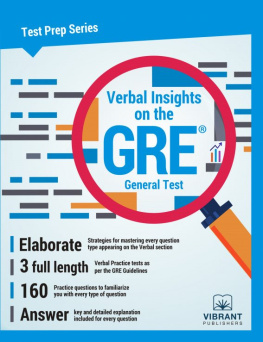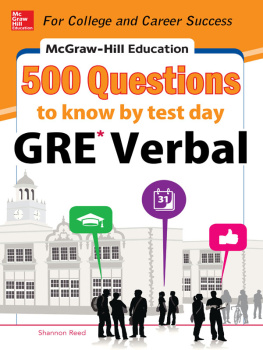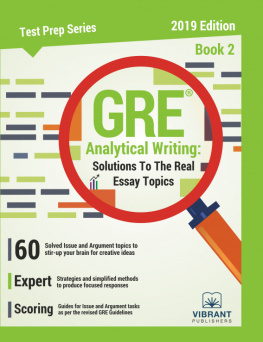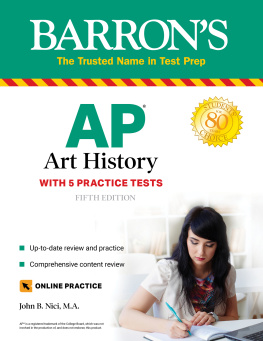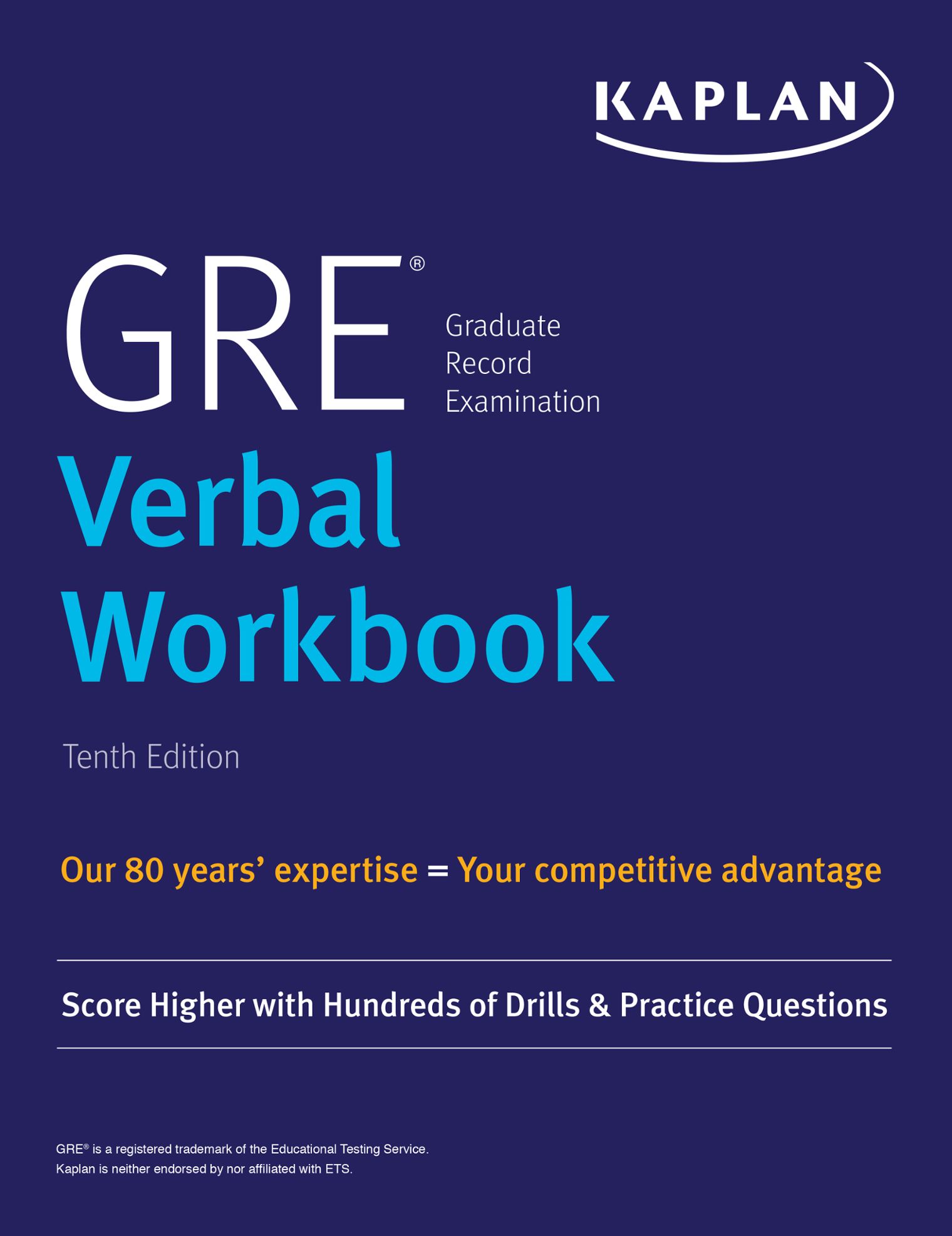
GRE is a registered trademark of the Educational Testing Service, which neither sponsors nor endorses this product.
This publication is designed to provide accurate and authoritative information in regard to the subject matter covered. It is sold with the understanding that the publisher is not engaged in rendering legal, accounting, or other professional service. If legal advice or other expert assistance is required, the services of a competent professional should be sought.
2019 Kaplan, Inc.
Published by Kaplan Publishing, a division of Kaplan, Inc.
750 Third Avenue
New York, NY 10017
All rights reserved. The text of this publication, or any part thereof, may not be reproduced in any manner whatsoever without written permission from the publisher.
ISBN: 978-1-5062-3530-1
10987654321
All rights reserved under International and Pan-American Copyright Conventions. By payment of the required fees, you have been granted the non-exclusive, non-transferable right to access and read the text of this eBook on screen. No part of this text may be reproduced, transmitted, downloaded, decompiled, reverse engineered, or stored in or introduced into any information storage and retrieval system, in any form or by any means, whether electronic or mechanical, now known or hereinafter invented, without the express written permission of the publisher.
For more GRE prep, Kaplan offers a range of print and digital products, available in stores and online:
- Kaplan GREPrep Plus with 3 Practice Tests and 500-Question Qbank
- Kaplan GREPrep with 2 Practice Tests
- GREMath Workbook
- Kaplan GRE Vocabulary Flashcards
To learn more about Kaplans comprehensive prep courses for the GRE, please visit kaptest.com/GRE.
Acknowledgments
Special thanks to the team that made this book possible:
Arthur Ahn, Matthew Belinkie, Shannon Berning, Lauren T. Bernstein, Kim Bowers, Gerard Cortinez, Elisa Davis, Lola Disparte, Boris Dvorkin, John Evans, Paula Fleming, Darcy Galane, Joanna Graham, Adam Grey, Allison Harm, Jack Hayes, Adam Hinz, Gar Hong, Sunny Hwang, Cinzia Iacono, Avi Lidgi, Kate Lopaze, Keith Lubeley, TJ Mancini, Jennifer Moore, Jason Moss, Walt Niedner, Robert Reiss, S. Ross, Derek Rusnak, Emily Sachar, Stephanie Schrauth, Sheryl Stebbins, Glen Stohr, Sascha Strelka, Gene Suhir, Martha Torres, Liza Weale, Lee A. Weiss, and many others who have contributed materials and advice over the years.
How to Use This Book
Kaplan has prepared students to take standardized tests for more than 75 years. Our team of teachers and researchers knows more about preparation for the GRE than anyone else, and youll find Kaplans accumulated knowledge and experience throughout this book. The GRE is a standardized test, so every administration covers the same content in roughly the same way. This is good news for you; it means that the best way to prepare is to focus on the sort of questions you are likely to see on Test Day. The main focus of this book is on strategic reviews, exercises, and practice tests with explanations that will help you brush up on your vocabulary, reading comprehension, and writing skills. If possible, work through this book a little at a time over the course of several weeks. There is a lot of material to absorb, and its hard to do all at once.
Getting Started
Part 1 of this book, Getting Started, provides you with background information on the Verbal Reasoning section of the test, what it covers, and how its organized.
Verbal Reasoning Section
The Verbal Reasoning section of the GRE contains three main question types: Text Completion, Sentence Equivalence, and Reading Comprehension. Part 3 of this book covers these types with strategies and sample questions. Your focus here should be to familiarize yourself with the question types so you wont be trying to figure out how to approach them on Test Day.
Read the explanations to all the questionseven those you got right. Often the explanations will contain strategies that show you how you could have gotten to the answer more quickly and efficiently.
Analytical Writing Section
The analytical writing content review covers grammar, mechanics, and style, as well as strategies for writing effective paragraphs and essays. The final chapters of this workbook cover sample GRE prompts. Using these prompts, you can practice the skills you have learned to write strong essays. In addition to sample prompts, weve also included sample top-scoring essays so you can review the qualities that earn an essay a high score.
Verbal Content Review
Once you have the big picture, focus on the content. Part 2 of this book, Verbal Content Review, gives you a complete tour of the vocabulary that you will see on Test Day. The material in the verbal content review is divided into particular subjects. Each subject begins with a review, followed by practice questions. This structure makes it easy for you to pinpoint the vocabulary concepts you need to review and quickly get your skills up to speed.
If you find that you would like access to more of Kaplans practice tests and quizzes, as well as in-depth instruction on the question types and strategies, look into the variety of course options available at kaptest.com/GRE.
If you have questions about what youre studying, ask our expert GRE faculty on our Facebook page: www.facebook.com/KaplanGradPrep.
Thanks for choosing Kaplan. We wish you the best of luck on your journey to graduate school.
Part One
Getting Started
Chapter 1
Introduction to GRE Verbal
Understanding the GRE Verbal Reasoning Section
The Verbal Reasoning sections of the Graduate Record Exam (GRE) emphasize complex reasoning skills and reward your ability to analyze the relationships among words and sentences as they are used in context. The exam tests vocabulary contextually, and the reading passages are both dense and written with a sophisticated level of diction. The goal of the tests content and emphasis on analytical skills is to provide an accurate indication of your ability to understand what youre reading and to apply reasoning skills to the texts premises and arguments. These are all skills you will need at the graduate level.
To perform well on the Verbal Reasoning sectionto answer correctly as many questions as possibleyou need to have a good grasp of vocabulary and the ability to apply reasoning skills. Part 2 of this book explains the various question types in detail. Part 3 reviews the foundations of vocabulary. Every chapter offers plenty of opportunities to practice and review your answers.
MST Mechanics
The GRE is a multi-stage test (MST). While working within a section of the test, you may skip questions and return to them as long as time remains for the section. The test is computer based, presented in an interface with tools such as a Mark button (to indicate a question you want to examine later within the time allowed for that section), a Review button (to see your progress on the entire set of questions in a section), and an optional time display. As you prepare for Test Day, consider how these computer capabilities may help you manage your time for each section.
As best you can, approach the exam as you would a paper-based one. After all, the idea behind the MST is that it will feel more comfortable and familiar than some other computer-based or adaptive tests, on which you cannot move about freely within a section. Use the MSTs design to your advantage. If a question looks too daunting, skip it. Use the Mark button to remind you to come back to the question when you have time at the end of that section. By doing so, you can better organize your time by keeping track of which questions you are done with and which ones need a second look.
Next page

